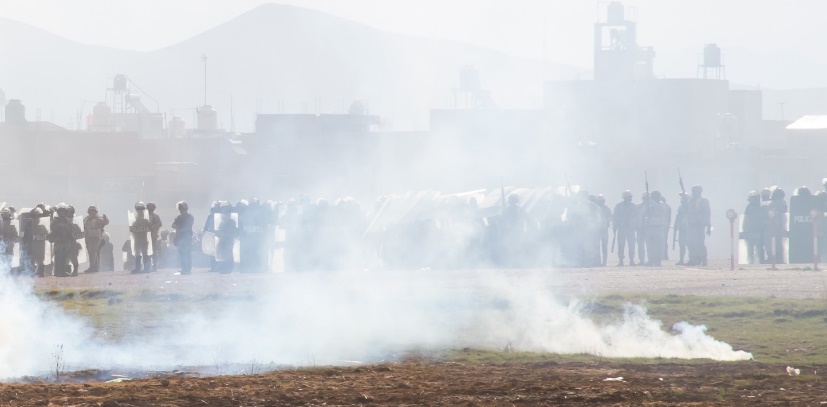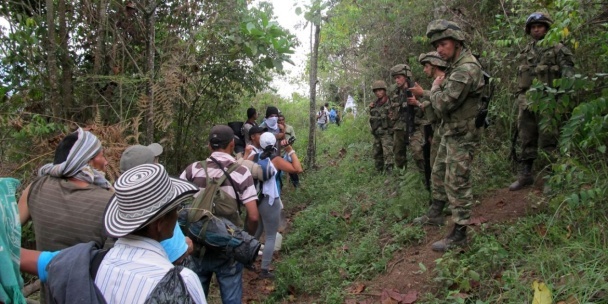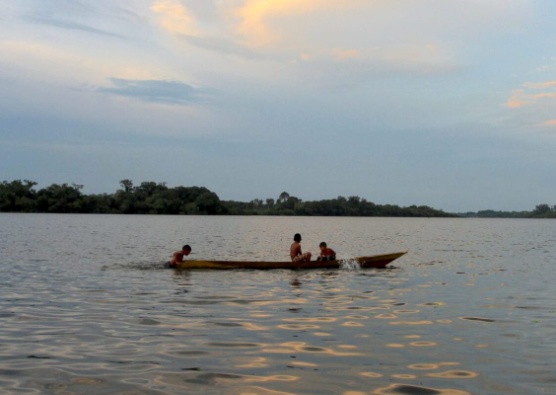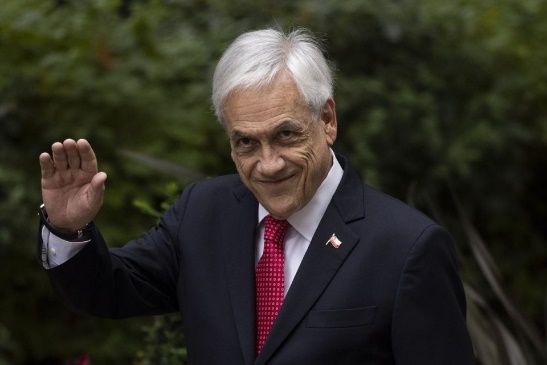This month, we have updates on Peru, Colombia, Brazil, Venezuela, Chile and Argentina. Amnesty has issued the full findings of its investigation of human rights abuses during the protests in Peru. There is a petition that you can sign demanding fundamental reform of the Colombian National Police. You can tweet calling for the Brazilian Senate to defeat a proposed new law that would open up the Amazon to huge new infrastructure projects. Other updates include the continuing persecution of human rights activists in Venezuela, the Chilean Government’s intention to nationalise the country’s lithium industry and the investigation into the involvement of the Catholic Church in Argentina’s brutal military dictatorship of 1976-83.
PERU
 On 25 May, Amnesty launched its full report on the illegitimate use of lethal force by the security forces in Peru that resulted in 49 deaths during the protests from December to February. Titled Lethal Racism: Extrajudicial Executions and unlawful use of force by Peru’s security forces, the report analyses 52 cases of people killed or wounded during the protests. It calls on the Attorney General’s office to investigate all those involved, up to the highest level.
On 25 May, Amnesty launched its full report on the illegitimate use of lethal force by the security forces in Peru that resulted in 49 deaths during the protests from December to February. Titled Lethal Racism: Extrajudicial Executions and unlawful use of force by Peru’s security forces, the report analyses 52 cases of people killed or wounded during the protests. It calls on the Attorney General’s office to investigate all those involved, up to the highest level.
On the Amnesty Peru website there is an email action you can take. Basically this demands that the National Prosecutor’s Office get to the truth and investigate those most responsible for the repression in Peru. You’re browser should translate into English; the option above send is asking is you want further information from Amnesty Peru (Sí) or not (No). Please also share our Facebook post and Tweet, if you use such platforms.
In a report released on 10 May, Human Rights Watch have reconstructed the events of 9 January, the single deadliest day of repression, when eighteen protestors and bystanders were killed, concluding that the security forces used disproportionate and indiscriminate force. The report, They, The Policemen, Killed My Brother, refutes official accounts provided to the Inter-American Commission on Human Rights and in public statements.
COLOMBIA

Amnesty International issued its submission with recommendations to the UN’s Human Rights Committee’s Universal Periodic Review of Colombia due November 2023. Major concerns are persistent violence against human rights defenders and lack of structural measures to protect them; lack of protection for refugee women regarding gender-based violence, and persistent impunity for human rights violations, including cases of unlawful use of force by the police in the context of protests. It notes that while some progress has been made on many of these issues there is a failure to implement them.
Following three major reports on the use of excessive force by the National Police against peaceful demonstrators during the 2021 National Strike, Amnesty is demanding a complete reform of how the National Police are recruited, trained, armed, organised within the Government and held to account for human rights violations and other crimes. Please sign the petition here.
The UN’s Office of Human Rights Committee on Torture has issued its report on Colombia. The Committee expressed its deep concern about allegations of acts of torture, both physical and psychological, and ill-treatment of peaceful demonstrators, human rights defenders and journalists, in addition to other serious violations allegedly committed by police officers and members of the Mobile Anti-Riot Squad during the peaceful protests of 2021, They ask Colombia to proceed with prompt investigations and prosecutions of those cases.
UN Special Rapporteur on trafficking in persons, especially women and children, Siobhán Mullally, conducted an official visit to Colombia from 22 to 30 May 2023. She denounced the trafficking of children who were forced into supporting and fighting and sexual abuse of girls by none-state armed groups. She also voiced her concern about the limited provision of shelters, and safe accommodation, which increases risks of re-trafficking of migrants, particularly Venezuelan.
El País (English) reports on the growing challenges facing President Petro in his plan for ‘Total Peace’. Negotiations with three of the five main armed opposition groups have ceased as they continue to recruit children and engage in warfare in Colombia. ‘This means that – at least formally – the military offensive against the three largest illegal organizations in the country has resumed. “All this shows that Petro was wrong when he offered the groups a ceasefire without [forcing them to make commitments]… nobody has complied with it,” says León Valencia, a political analyst and director of the Peace and Reconciliation Foundation (Pares) in Bogotá.’
The Internal Displacement Monitoring Centre reports that 339,000 people were forcibly displaced as a result of the violence in Colombia in 2022, the highest number in more than a decade. ’NSAGs [non-state armed groups] particularly targeted and intimidated social and community leaders and environmental and human rights defenders, forcing them to flee. Some rural communities were also dispossessed of their land.’ The increase in displacement and cases of forced confinement heightened humanitarian needs across the country. Ninety-seven per cent of IDPs did not have their needs met in at least one sector of humanitarian assistance, compared with 67 per cent of host communities.
BRAZIL

Amnesty International has submitted its analysis and recommendations to the UN’s Human Rights Committee’s Universal Periodic Review for Brazil, due to begin 26 June 2023. The report highlights Brazil’s failure to address extrajudicial executions and other violations committed in the context of policing and the so-called “war on drugs”, especially its disproportionate and discriminatory impact on Black people driven by systemic racism. It also addresses problems related to the shrinking space for civil society organizations and human rights defenders. Lastly, it raises concern over the situation of Indigenous, Quilombola, and other traditional peoples.
The lower house of Congress, dominated by the conservatives, has passed a law which opens up the Amazon to huge infrastructure projects, reclaims land from indigenous communities and invalidates land claims by indigenous communities who cannot prove their physical occupation of the land in October 1988, the day that Brazil’s constitution was enacted. The bill will now go to the Senate. Amnesty International asks us to take action:
Please send a Tweet with the text ‘The Brazilian Congress must vote against the approval of PL 490 and in favour of the Brazilian population, the protection of indigenous peoples, forests, the environment, climate, fauna and flora and all native communities.’ Please use the following hashtags and handles #PL490Não #MarcoTemporalNão #SOSPovosIndígenas @ArthurLira @DepArthurMaia. These appeals are to Arthur Lira – President of the House of Representatives, @ArthurLira and Arthur Maia – Reporter of the Bill 490/07, @DepArthurMaia.
The UN’s Committee Against Torture expressed its deep concern about the persistent use of excessive force, especially lethal force, by law enforcement and military officials in the context of security operations to combat organised crime. It expressed serious concern about the grave human rights violations, including extrajudicial killings, torture, sexual violence and beatings, perpetrated predominantly against Afro-Brazilians. The Committee calls on the State to demilitarise law enforcement, strengthen independent oversight, investigate, prosecute and recompense victims. Brazil’s police kill around 6,000 civilians every year.
Amazon Watch reports that twenty well-armed miners attacked the Yanomani in the Amazon, killing one man and wounding two others. This is but the latest attack by illegal miners on the Yanomani. The shootings occurred following a three-month operation that, according to Brazil’s Ministry of the Environment, destroyed 327 miners’ camps, 18 planes, 2 helicopters, hundreds of engines, and dozens of rafts, boats, and tractors. Sunday’s attack was the fourth since the start of the operation.
Good News! Amazon Watch applauds the ruling of the Federal Court which upholds the territorial rights of the Mura indigenous community, orders the removal of signs by Potássio do Brasil and fines the company. ‘Potássio do Brasil’s massive project, which involves the extraction and processing of potassium in Autazes and transportation via rivers and roads, raises concerns among environmentalists.’
VENEZUELA
The persecution of human rights activists has continued throughout 2023, with El Centro para los Defensores y la Justicia verifying that there have been 20 attacks and security incidents perpetrated in April alone. Likewise, the non-governmental organization Espacio Publico has documented 17 violations of the right to freedom of expression in March, including censorship, intimidation and threats, with the institutions of the State primarily responsible for the violations. Regarding the rights of women, Venezuelan non-governmental organisation Utopix has registered 16 femicides in May, bringing the total so far in 2023 up to 63. NGOs have criticized the Maduro regime of failing to tackle the issue of violence against women in the country.
Amnesty continues to campaign for the cases of Emirlendris Benitez and Javier Tarazona. Benitez is a 42-year-old mother who was arbitrarily detained in August 2018, subjected to torture and is now facing an unjust 30-year prison sentence. We are calling for the urgent provision of medical care, made necessary because of her mistreatment. Tarazona is the Director of Venezuela NGO FundaRes and was arbitrarily detained in July 2021. He is now being charged without evidence of inciting hatred, treason, and terrorism. We are calling for his release.
In November 2020, Guillermo Zárraga, a 59-year-old Venezuelan engineer and a former industry unionist, was arbitrarily detained. Since then, he has been charged and tried for criminal association and for allegedly revealing national security information. There is no evidence to substantiate those allegations and Guillermo’s trial was marred by a failure to provide due process. Since then, Guillermo’s health has severely deteriorated as a result of inhumane detention conditions and inadequate nutrition. In March, he suffered a cardiac syncope. His blood test results show a severe disbalance that requires urgent care and his family has reported that his weight has dropped over 20 kilos. There is an Urgent Action letter on the AIUK website. As with all actions sending letters to UK Ambassadors has impact. For Venezuela it’s Mrs Rocío Maneiro, Embassy of the Bolivarian Republic of Venezuela, 1 Cromwell Road, London SW7 2HW
More widely, Brazilian President Luiz Inacio Lula da Silva met Venezuelan President Nicolas Maduro on 29 May, renewing a relationship severed under former Brazilian president Jair Bolsonaro. The two are scheduled to discuss how best to build bilateral relations between the two countries, including the potential re-opening of their respective embassies. Analysts have said that President Lula may be looking to capitalise on political affinities between governments in the region to revive the currently defunct Union of South American Nations.
The BBC has recently published research detailing how the Venezuelan government pays citizens to publish pro-government content on social media platforms. Non-governmental organisations in the region see these arrangements as another method for suppressing free speech, effectively pushing social media content critical of the government to the end of news feeds and ensuring that only pro-government content is visible. The Venezuelan government has already been accused this year of creating fake videos using artificial intelligence to spread propaganda online.
CHILE
At the end of April Chile’s President Gabriel Boric announced he would nationalize the country’s lithium industry. Chile is the world’s second largest producer – and has the world’s largest lithium reserves. Among many uses, Lithium is essential for the manufacture of electric vehicle batteries.
President Boric said the move was to boost the economy and protect its environment. There are significant human rights implications as well – lithium extraction poses risks to Indigenous peoples’ water resources and fragile ecosystems.
The government would not terminate current contracts but hope companies would be open to state participation before they expire. Future lithium contracts would only be issued as public-private partnerships with state control.
 Meanwhile former President Sebastián Piñera (above) is being investigated for alleged crimes against humanity during the social uprising in 2019. In April he testified for more than 10 hours under examination by prosecutor Ximena Chong, who is leading the investigation. Some of the alleged crimes against humanity that are brought against Piñera and his administration include homicides, unlawful detentions, excessive use of force, and causing eye trauma.
Meanwhile former President Sebastián Piñera (above) is being investigated for alleged crimes against humanity during the social uprising in 2019. In April he testified for more than 10 hours under examination by prosecutor Ximena Chong, who is leading the investigation. Some of the alleged crimes against humanity that are brought against Piñera and his administration include homicides, unlawful detentions, excessive use of force, and causing eye trauma.
UN Special Rapporteur on human rights and the environment, David Boyd, paid a visit to Chile from May 3 to May 12. Boyd concluded that the country faces an environmental crisis that violates human rights such as the fundamental right to live in a clean, healthy, and sustainable environment. In his report the UN Special Rapporteur said:- “These crises include: profoundly disturbing sacrifice zones where marginalized and vulnerable communities suffer exposure to toxic substances and environmental degradation; water scarcity, as many rural residents lack access to safe and sufficient water; and deadly air pollution.”
The Escazú Agreement is an international treaty initially signed by 25 Latin American and Caribbean nations concerning the rights of access to information about the environment, public participation in environmental decision-making, environmental justice, and a healthy and sustainable environment for current and future generations. Chile was not one of the original signatories, but has now ratified the agreement.
Article 9 of the Agreement sets out the need for a “protection regime” for environmental human rights defenders. According to it, States parties must develop measures to secure a safe environment for environmental human rights defenders, recognize the rights of environmental defenders to participate in environmental defence activities, and prevent, investigate and punish attacks committed on environmental defenders.
Amnesty Chile is meeting with authorities around the implementation of the Escazú Agreement and any proposed changes to the law for the protection of human rights defenders. This has implications on some ongoing campaigns in Chile, such as the Woman’s Water Defenders in Petorca province. Consequently, there is no specific advocacy at the moment, but we will be taking solidarity actions in support of the Woman’s Water Defenders over coming months.
ARGENTINA
The results of an in-depth investigation by the Argentine Synod into its actions during the brutal 1976-1983 military dictatorship, have been published. In it the Argentinian Catholic leaders offers mea culpa to victims for the Church’s role.
“We want to know the historical truth and ask for forgiveness from God, the Argentine community and the victims of the violence,” write the members of the Argentine Episcopal Conference (Conferencia Episcopal, CEA, or Argentine Synod) in the introduction to the first volume. “We are aware that in many decisions, actions and omissions, the CEA was not up to the task.”
Argentina’s press freedom ranking dropped 11 places – from 29 to 40 – in 2023, according to a report released by the Reporters Without Borders. The report indicated significant drops in economic, social, and security indicators for press freedom. It stated:- “Heavily concentrated and opaque media ownership, polarisation, the lack of governmental policies guaranteeing media pluralism, and low pay for journalists are the main threats to freedom of expression in Argentina.”
Amnesty Argentina has just published a report “Police violence: what happens next? Investigation, Supervision and Accountability of Policing”. Currently only in Spanish, the summary on the Amnesty Argentina website is highly critical. Deficiencies in judicial investigations, cover-ups, and investigating only “official reports” are just some of the widespread practices that are reported. This perpetuates police violence and leads to impunity.
Mariela Belski, executive director of Amnesty International Argentina, said:- “Argentina has shown a profound inability to effectively investigate the illegal actions of the security forces. The accountability processes for police action do not show a serious commitment to justice and reparation for the victims. The involvement of all levels of the State and all provinces is essential to advance practices that respect human rights.”
The report lays out recommendations for a way forward. But in an election year, Amnesty International reiterates its concern at the absence of comprehensive plans and measures from candidates to combat institutional violence.
All the best,
South America Team – Richard Crosfield (Colombia and Brazil), David Rogers (Argentina and Chile), James Baird (Venezuela) and Graham Minter (rest of South America).